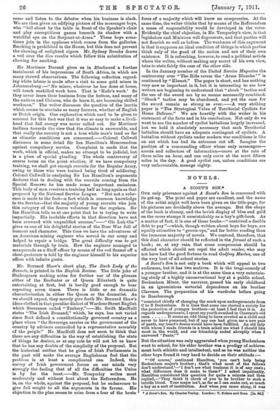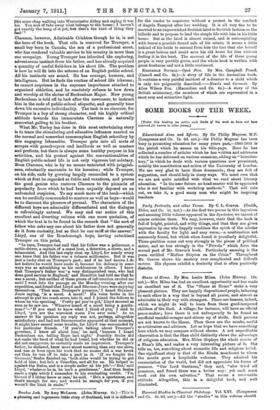NOVELS.
A SCOUT'S SON.*
Ourc only grievance against A Scout's Son is concerned with its get-up. The print and paper are excellent, and the name of the artist might well have been given on the title-page, for
his pictures are decidedly above the average. But the shape of the book is clumsy, and the lavish display of blue and gold on the cover stamps it unmistakably as a boy's gift-book. As a matter of fact, it is one of those books—" contrived a double debt to pay "—which, though written about boys for boys, are equally attractive to "grown-ups," and far better reading than the immense majority of novels. We contend, therefore, that this dual character should be reflected in the format of such a book; or, at any rate, that some compromise should be effected which should not repel the adult reader, who may not have had the good fortune to read Godfrey Marten, one of the very best of all school stories.
A Scout's Son is not only a book which will appeal to two
audiences, but it has two motives. It is the tragi-comedy of a younger brother, and it is at the same time a very entertain- ing study of a highly unconventional boy at a public school. Beckenham Minor, the narrator, passed his early childhood in an ignominious sartorial dependence on his brother Clarence. The preparation of his wardrobe before going to Rossborough
"consisted chiefly of changing the mark upon undergarments from C to B Beckenham. It is time that some one started a society for the protection of younger brothers—at least I feel that it is. As regards undergarments, I spent my youth swathed in Clarence's old ones It seems an odd thing to have coveted as a child and never to have possessed, but if any one had given me a new pair of pants, my heart's desire would have been fulfilled. An old lady with whom I made friends in a train asked me what I should like most in the world, and our friendship ended abruptly when I answered Pants!"
But the situation was only aggravated when young Beckenham went to school, for his elder brother was a prodigy of achieve- ment both athletic and intellectual, and as he was neither the other boys found it very hard to decide on their attitude :—
" (Of course,' continued Hamilton, 'you can't help being Beckenham major's brother ; that's what most of the fellows don't understand.'—' I don't see what business it is of any one's ; what difference does it make to them?' I asked impatiently. Hamilton considered this question for quite a minute and then replied,—' They think it cheek of you to be brother to such a terrific blood. Your major isn't, as far as I can make out, so much a boy as a sort of institution. And when you came along, it was • A Scout's Sou. By Charles Turley. Loudon: T. Nelson and Sons. [Si. 541.1
like some chap walking into Westminster Abbey and saying it was his. You sort of take away what belongs to the house ; I haven't got exactly the hang of it yet, but that's the kind of thing they feel.'" Clarence, however, Admirable Crichton though he is, is not the hero of the book. That role is reserved for Trumper, a small boy born in Canada, the son of a professional scout, who has rendered valuable service to his country in more than one campaign. Young Trumper has inherited the exploring, adventurous instinct from his father, and has already acquired a quantity of useful field-lore in his short life. The problem is how be will fit into the scheme of an English public school.
All his instincts are sound. He has courage, humour, and intelligence. But he finds the routine of sohool life irksome; he cannot acquiesce in the supreme importance attached to organised athletics, and he resolutely refuses to bow down and worship at the shrine of Beckenham Major. Now young Beckenham is told off to look after the newcomer, to instruct him in the code of public-school etiquette, and generally tone down his excessive individuality. The task is no sinecure, for Trumper is a boy of strong character, and his highly critical
attitude towards the immaculate Clarence is naturally somewhat galling to his brother.
What Mr. Turley has done in this most entertaining story is to trace the stimulating and educative influence exerted on the normal and somewhat commonplace English schoolboy by this engaging Ishmaelite. Trumper gets into all sorts of scrapes with gamekeepers and landlords as well as masters and prefects, but there is always some healthy purpose in his activities, and his protest against the conventionalities of English public-school life is not only vigorous but salutary. Even Clarence, who is by no means untainted with priggish- ness, reluctantly succumbs to his heresies ; while Trumper, on his side, ends by growing largely reconciled to a system which at first he regarded as futile and vexatious, and proves the good genius who restores Clarence to the pinnacle of popularity from which he had been unjustly deposed on an unfounded suspicion. To say much more of the book—which can be cordially commended to masters as well as boys—would be to discount the pleasure of perusal. The characters of the different boys are admirably differentiated and the dialogue is refreshingly natural. We may end our notice of this excellent and diverting volume with one more quotation, of which the text is to be found in the remark that "the sort of fellow who asks any one about his father does not generally do it from curiosity, but so that he can sniff at the answer." Lloyd, one of the Rossborough boys, having catechised Trumper on this point,
"In turn, Trumper had said that his father was a policeman, a cattle-driver, a captain of a canal boat, a detective, a clown, and a tobacconist. And this last reply shut up Lloyd, for nearly every one knew that his father was a tobacco millionaire. But it was just a lucky shot on Trumper's part ; and if he had known I do not believe he would have made it because his delicacy in some ways was as astonishing as his recklessness in others. I knew that Trumper's father was • a very distinguished man, who had done good service to England,' and Hamilton had told me that he was a scout ; but neither of these pieces of information excited me until I went into the passage on the Monday evening after our expedition, and found that Lloyd and Sturmer-Jones were enjoying themselves. 'That man Trumper's governor,' I heard Sturmer- Jones saying, • is a scout. A scout!' His voice broke in his attempt to put too much scorn into it, and I joined the fellows to whom he was speaking. Pretty pal you've got,' Lloyd sneered as soon as he saw me. 'Whoever heard of a scout being a gentle- man ?'—' If you want to know what I think of you,' I said to Lloyd, 'you are the wormiest worm I've ever seen.' As an answer to his question my reply was not, perhaps, altogether satisfactory; and had not Summerscales appeared at that moment, it might have caused some trouble, for Lloyd was surrounded by his particular friends. If you're talking about Trumper's governor, I know all about him,' he said, because I heard Beckenham ma. telling Hope last night.' Possibly Scales did not make the least of what he had heard, but whether he did or did not exaggerate, he certainly made an impression. Trumper's father, he declared, knew more about scouting than any one alive, and was so keen upon his work that no sooner did a war break out than he was off to take a part in it. If we fought the Germans,' Scales finished up, 'both sides would be trying to get hold of him ; but he's a Canadian, and all for us. He helped us against the Zulus, and is a simple nailer at his job.'—' But,' said Lloyd, whatever he is, he isn't a gentleman.' And then Scales made a reply which I remember to his everlasting credit. 'I'm blowed if I either know or care,' he said. 'He's a sportsman, and that's enough for me; and would be enough for you, if you weren't the limit in snobs."



















































 Previous page
Previous page